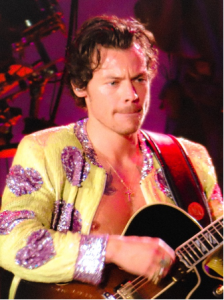Harry Styles might be the world’s biggest pop star. Styles began his musical career in 2010 as a member of the band One Direction, and he is now one of the most popular solo artists in the world. At February’s GRAMMY Awards, Styles’s “Harry’s House” won Album Of The Year, arguably the most significant award at the show.
Styles is known not only for his music and sold-out performances, but also for his fashion and branding. He sells merchandise, including sweatshirts, t-shirts, and water bottles depicting his name, likeness, and “Treat People with Kindness” slogan. As is common with celebrity merchandise, unauthorized retailers sold counterfeit apparel using the “Harry Styles” trademarks. This blog post will analyze Styles’s trademark infringement lawsuit and explain why Styles was able to secure a favorable settlement.

Harry’s Trademarks
Harry Styles recently sued 200 e-commerce defendants who allegedly sold counterfeit merchandise. Styles alleged trademark infringement, specifically counterfeiting, of the trademarks “Harry Styles” and “Harry Styles Treat People with Kindness.” Counterfeiting, a type of trademark infringement, occurs when a defendant uses an identical or nearly identical trademark in commerce without permission.
To establish common law trademark rights, Styles was the first to sell merchandise bearing the trademarks. Styles wore a “Treat People with Kindness” badge on his guitar strap during a concert in 2017. This slogan took off with fans. Styles first released merchandise with the slogan in June 2018, and then released a song called “Treat People with Kindness” in 2019. In the complaint, Styles asserted that long-standing use gave him common law trademark rights in both the “Harry Styles” and “Treat People with Kindness” trademarks.
Additionally, Styles registered both of these trademarks at the USPTO. Trademark registration provides prima facie evidence of a trademark’s validity and ownership, streamlining a trademark infringement lawsuit.

Harry’s Claims
To prevail on the trademark infringement claims, Styles needed to prove that 1) his trademarks were valid, and 2) the defendants’ unauthorized use of the trademarks caused a likelihood of consumer confusion regarding the origin or sponsorship of defendants’ products with Styles. Styles had both common law and federal trademark rights, so his trademarks are valid. The second element, likelihood of confusion, was at issue in the complaint.
Styles did not go through an in-depth analysis of the likelihood of confusion factors in his complaint. Nevertheless, he asserted that the defendants intentionally confused the public that their counterfeit products were associated with Styles. Likelihood of confusion is a balancing test, including factors such as the relatedness of the goods sold by the parties, the similarity of the trademarks, and the defendant’s intent. Considering that the defendants sold products with identical or nearly identical trademarks, likelihood of confusion was apparent.
Harry’s Remedy
An Illinois judge granted Styles preliminary injunction, which is when a party is required to perform or required to refrain from performing an act before an actual trial. In this case, the judge’s preliminary injunction required all defendants to cease selling products that bore Styles’s valid trademarks.
This preliminary injunction led Styles to settle with four of the retailers, who agreed to pay Styles a total of $17,500 in damages for trademark infringement. Styles also won a default judgment against 100 of the defendants who did not respond to the complaint. A default judgment occurs when a judge awards a plaintiff favorable verdict because a defendant failed to respond to a complaint. The judge ordered each defaulting defendant to pay $200,000 in statutory damages to Styles. Moreover, third party sellers of the goods, such as Amazon, could no longer advertise the defaulting defendants’ goods online.

Why Illinois?
Since the defendants sold counterfeit products online in most states, Styles had his choice of what state to sue in, and he made a conscious decision to file the lawsuit in Illinois. Illinois federal courts are earning a plaintiff-friendly reputationfor lawsuits seeking to enjoin many unauthorized storefronts from selling counterfeit goods.
The Styles case is an example of “Schedule A” litigation, where a plaintiff can name hundreds of defendants in a “Schedule A” listing that is separate from the complaint. Instead of providing full names and addresses to identify the defendants, the plaintiff may only provide URLs. Furthermore, these listings can be sealed (kept private by the court with restricted outside access) to prevent the destruction of evidence. But this may prevent defendants from learning about the lawsuit, and then a judge will likely enter default judgment against the unresponsive defendants.
For instance, Toho Co. Ltd, a Japanese film company that owns the “Godzilla” trademark, won a similar injunction to Styles last year in Illinois. The judge ordered 249 unauthorized e-commerce retailers to cease selling apparel and accessories that bore the “Godzilla” trademark. As noted on the “Schedule A” listing, many of the defendants were not actual companies.
Studies show that the rise of online shopping has increased the prevalence of counterfeit goods to the detriment of established brands. If Styles’s successful lawsuit is any indication, plaintiffs can follow his blueprint to protect their brands. The Styles case demonstrates that Illinois judges are willing to award default judgments against hundreds of unauthorized e-commerce defendants who do not respond to a complaint. These defendants may not know about the lawsuit, which has been criticized as unfair.
Even if a plaintiff only identifies a defendant via URL, this can effectively halt a defendant’s business. Plaintiffs should continue to file trademark infringement lawsuits against infringing retailers, and given the Styles verdict, it would not be surprising for plaintiffs to continue to choose Illinois as their forum.

Landon Wilneff
Associate Blogger
Loyola University Chicago School of Law, JD 2024
